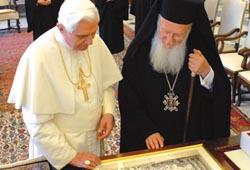The Patriarch of Constantinople, Bartholomew I, wrote a letter on occasion of the abdication of Pope Benedict. It is a warm letter and testimony to his co-worker in the vineyard. In an era of lots of change in the leadership of many changes, it is interesting to what is said,
It is with regret that we have learned of the decision by His Holiness Pope Benedict to retire from his Throne, because with his wisdom and experience he could have provided much more to the Church and the world.
Pope Benedict leaves an indelible mark on the life and history of the Roman Catholic Church, sealed not only by his brief papacy, but also by his broad and longstanding contribution as a theologian and hierarch of his Church, as well as his universally acknowledged prestige.
His writings will long speak of his deep theological understanding, through his knowledge of the Fathers of the undivided Church, his familiarity with contemporary reality, and his keen interest in the problems of humankind.
We Orthodox will always honor him as a friend of our Church and a faithful servant of the sacred proposition for the union of all. Moreover, we shall rejoice upon learning of his sound health and the productivity of his theological work.
Personally, we remember with emotion his visit to the See of the Ecumenical Patriarchate over six years ago, together with the numerous encounters and excellent cooperation, which we enjoyed throughout the duration of his primatial ministry.
From the Phanar, we pray that the Lord will manifest his worthy successor as the head of the sister Church of Rome, and that we may also continue with this successor on our common journey toward the unity of all unto the glory of God.
Like many of Benedict’s important works this text of Bartholomew’s is very significant naunced. As you would expect. It is a very good, interesting and helpful letter between two churchmen. If you’d like to break it down, Bartholomew expresses a clear appreciation of Benedict personally: his “wisdom”, his “theological understanding”, “friend of our Church,” and “primatial ministry.” But you will also see an acknowledgment of an understanding of the papacy for the Orthodox.
Orthodox churchmen are very sensitive to the notion of primacy; but then again, so are Catholics. Some of the rhetoric coming from the leaders, of high and low estate, is often exaggerated and accented in unrealistic ways while misreading history. The letter of Bartholomew may give a new interest in a willingness of the Orthodox to renew and widen their understanding of the primatial role of the Bishop of Rome. On paper, the Orthodox accept, though in a restricted sense of the primatial ministry of the pope. Work needs to be done in Orthodox circles that accept the Pope, as first among equals, and as a court of final appeal in matters doctrinal, matters of tradition, and ecclesial power (jurisdiction). Pope Benedict is ecumenical in the best and truest sense of the word.
